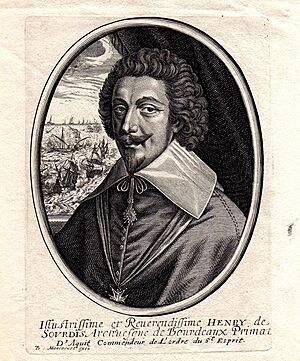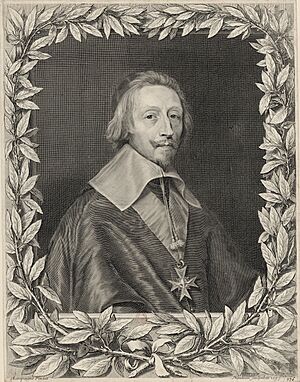Battle of Tarragona (August 1641) facts for kids
Quick facts for kids Battle of Tarragona |
|||||||
|---|---|---|---|---|---|---|---|
| Part of the Franco-Spanish War (1635) and the Catalan Revolt |
|||||||
|
|||||||
| Belligerents | |||||||
| Commanders and leaders | |||||||
| Strength | |||||||
| 26 galleons 19 galleys 8 brigantines 4 fireships |
30–35 galleons and frigates 29 galleys 65 transport ships |
||||||
| Casualties and losses | |||||||
| Severe human losses and naval damage 1 fireship captured |
Minor | ||||||
The Battle of Tarragona was an important naval battle. It happened between August 20 and 25, 1641. This fight was part of the Franco-Spanish War. It also played a role in the Catalan Revolt.
The battle took place near the city of Tarragona. The Spanish fleet fought against the French fleet. The Spanish ships were led by the Duke of Fernandina and the Duke of Maqueda. The French fleet was under the command of Henri d'Escoubleau de Sourdis.
The main goal for Spain was to break the French naval blockade of Tarragona. The city was also under siege by land forces. The Spanish fleet won the battle. They forced the French navy to retreat. This victory helped lift the land siege of Tarragona as well.
Why the Battle Happened

In 1641, the region of Catalonia was in revolt. French troops and Catalan rebels wanted to capture Tarragona. This city was one of the few places still held by Spain. In April 1641, a French and Catalan army began to surround Tarragona. They tried to capture it by land.
At the same time, the French navy helped with the siege. Their ships blocked the port of Tarragona. This stopped any supplies or help from reaching the city by sea.
Spain tried to break this blockade in July 1641. A Spanish fleet, led by the Duke of Fernandina, fought hard. They managed to get some supplies into Tarragona. But they could not fully break the French blockade.
So, Philip IV of Spain ordered a much larger fleet to be built. This new fleet had a clear mission. It had to force the French to leave Tarragona. The Duke of Maqueda was put in charge of this big fleet. He sailed from Cádiz on July 20. Many ships from different parts of Spain joined him. The Duke of Fernandina also joined with his remaining ships. The Spanish fleet became very strong. It had many warships and 65 transport ships. These transport ships carried important supplies for Tarragona.
The Battle of Tarragona
On August 20, the large Spanish fleet arrived near Tarragona. The French fleet quickly got ready for battle. They started firing at the Spanish ships. The French commander, Sourdis, tried to block the Spanish fleet's path.
But the Spanish ships fired back strongly. They caused serious damage to the French warships. The French fleet had to move away from the harbor entrance. This meant the blockade was broken!
With the French ships busy fighting, the Spanish supply convoy sailed into the port. The people defending Tarragona were very happy. The main goal was achieved.
After the supplies were safely inside, the Spanish galleys attacked the French fleet's side. At the same time, the Duke of Maqueda's warships attacked the French front. Some French ships were badly damaged. But the French commander, Sourdis, did not lose any ships.
On August 25, Sourdis ordered his fleet to retreat. He had saved all his ships. But the Spanish now controlled the sea around Tarragona. The land siege of Tarragona also had to be stopped. The Spanish fleet could now bring supplies to other Spanish towns.
What Happened Next

In France, the powerful minister Cardinal Richelieu was very angry. He removed Sourdis from his job. A younger officer, Jean Armand de Maillé-Brézé, took his place.
In Spain, something unusual happened. Even though he won, the Duke of Fernandina was also removed from his command. The Count-Duke of Olivares, a powerful Spanish minister, was not happy. He thought Fernandina should have completely destroyed the French fleet. Fernandina was even put in prison for a short time.
It was strange that both admirals, the winner and the loser, faced punishment. However, Sourdis's removal was permanent. But the Duke of Fernandina was later set free. After Olivares lost power in 1643, Fernandina got his job back. He even became part of the King of Spain's important council.
The war continued after this battle. The next year, another naval battle happened near Barcelona. This battle was the Battle of Barcelona (1642). It led to France taking control of Perpignan.
See also
 In Spanish: Segunda batalla de Tarragona para niños
In Spanish: Segunda batalla de Tarragona para niños
 | Kyle Baker |
 | Joseph Yoakum |
 | Laura Wheeler Waring |
 | Henry Ossawa Tanner |

